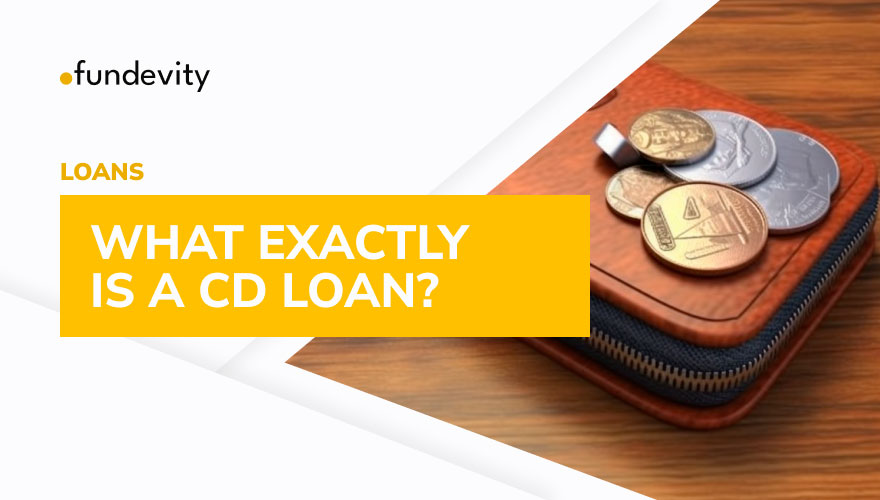What Exactly Is a CD Loan?

A certificate of deposit, or CD, is a form of savings account that pays interest on a set amount of money that you deposit for a set period of time, such as six months, a year, or more.
When you deposit money into a CD account, the issuing bank agrees to pay you interest over a set period of time. The account’s annual percentage yield represents this (APY). You’ll typically earn more interest than you would in a traditional savings account.
Every CD has a maturity date, so if you take your money out early, you’ll usually be charged a penalty, which can range from two to twelve months’ interest, depending on how long you’ve had the account.
How Does a CD Loan Work?
Although CDs are primarily used for saving, certain banks and credit unions will allow you to borrow against the funds in an existing CD by using it as security. A CD loan, like any other personal loan, has a specified borrowing amount, lending term, and interest rate. Also, your monthly payments will be set.
CD-secured loans, like personal loans, can be used to fund nearly anything, including debt consolidation, significant purchases, and unexpected expenses. You may be able to borrow up to the full value of your CD account, or just a portion of it, depending on the bank.
In general, a CD loan is easier to qualify for than an unsecured personal loan. This is because if you default on your loan, financial institutions can confiscate the security you used to secure the credit. Because of the creditor’s reduced risk, these secured personal loans are easier to qualify for and may have lower interest rates.
Pros and Cons of CD Loans
For some people, CD-secured loans are a wonderful idea, but they aren’t for everyone. Here are some of their most significant advantages and disadvantages.
Pros
- Easy application process: If you apply for a CD loan with the bank or credit union that holds your CD, you may usually acquire loan approval quickly, sometimes within hours, and funds in a day or two.
- Continued growth: Your CD will collect interest for the duration of the loan.
- Long repayment terms: Banks and credit unions typically provide liberal repayment terms, allowing you to return payments for up to ten years.
- Good for debtors with terrible credit: CD-secured loans are frequently approved for debtors with bad credit.
Cons
- If you can’t repay the loan, you’ll lose money on the CD: If you stop paying, a bank would usually utilize your CD to pay off the outstanding loan, and defaulting will harm your credit. It’s a two-for-one deal, you lose money and your credit score suffers.
- CD loans are unusual: Many national banks do not offer them. Your CD will very certainly have to be held at the same bank as the CD loan.
- Some costs may apply: Creditors may charge an origination fee or a prepayment fee if the loan is paid off before the term ends. This is on top of the interest you’ll have to pay.
- Setbacks with cashing out: You can’t cash out your CD until you’ve paid off your debt.
Who Takes Out CD Loans?
CD loans are ideal for consumers who need money for unexpected emergencies or who wish to create or improve their credit. Because CD secured loans require security, they are easier to qualify for debtors with bad credit or no credit. It can help you enhance your credit score if you repay the loan on time.
CD loans are also ideal for customers who don’t want to face an early withdrawal penalty for taking money out of their account too soon. If that’s the case, compare the cost of the loan to the cost of withdrawal costs.
Alternatives to CD Loans
If you don’t want to risk losing your CD money due to a loan default, explore these other choices for getting the money you need.
Secured Credit Cards
A secured credit card can be a wonderful option if you need to develop or enhance your credit. Secured credit cards feature credit limits equivalent to the amount of money you put in a security account. If you don’t pay your debt, the bank can seize your cash deposit, much like a CD loan.
Secured Personal Loans
A secured personal loan can also be backed by another sort of security, such as a regular savings account, money market account, car, or piece of jewelry. If you don’t pay your loan on time, your creditor may take any security you put up to cover the amount you owe.
Unsecured Personal Loans
A secured personal loan requires you to put up an asset as security, whereas an unsecured loan does not. If you default, your creditor will likely send your account to a collection agency, which might result in a significant decline in your credit score. If you don’t pay back your debt, your creditor may file a lawsuit against you.
Savings-secured Loans
You pledge your savings account funds as security for a savings-secured loan. Fixed-rate periods are common on savings-secured loans, allowing you to make the same monthly payment for the duration of the loan. Because the loan is backed by your own funds, banks frequently grant same-day approval.
Peer-to-peer (P2P) Loans
If you don’t have access to a CD account or the cash to start one, a peer-to-peer loan may be a better option than a standard personal loan. Peer-to-peer lending is a means to avoid working through a bank, credit union, or online creditor because it is backed by investors who use an internet lending platform.
0% APR Credit Cards
If you have decent to exceptional credit, a 0% APR credit card is one option to avoid paying interest altogether. For up to 21 months, these cards often offer no-interest financing on purchases or debt transfers.


